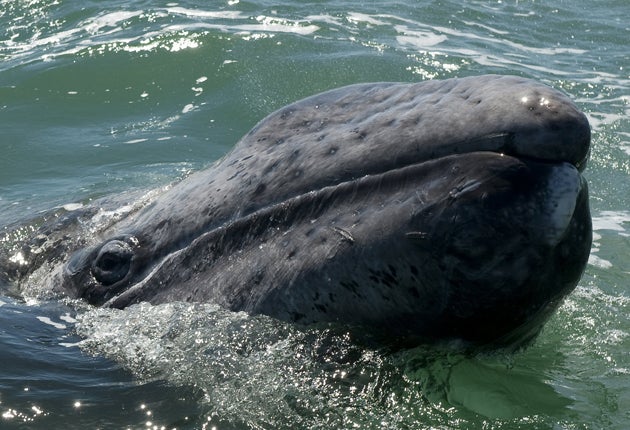Oscar-winner directs sting on Hollywood's favourite sushi spot
Guy Adams visits the restaurant which is under investigation for serving up whale to its high-end clients

Your support helps us to tell the story
From reproductive rights to climate change to Big Tech, The Independent is on the ground when the story is developing. Whether it's investigating the financials of Elon Musk's pro-Trump PAC or producing our latest documentary, 'The A Word', which shines a light on the American women fighting for reproductive rights, we know how important it is to parse out the facts from the messaging.
At such a critical moment in US history, we need reporters on the ground. Your donation allows us to keep sending journalists to speak to both sides of the story.
The Independent is trusted by Americans across the entire political spectrum. And unlike many other quality news outlets, we choose not to lock Americans out of our reporting and analysis with paywalls. We believe quality journalism should be available to everyone, paid for by those who can afford it.
Your support makes all the difference."Is this the whale?" joked a noisy patron, pointing to some dark red slabs of tuna on the small tray of sushi, which had just been deposited on his table at one of California's renowned sushi restaurants "Come on guys, it's your signature dish! Where's it gone? I'm feeling left out here!"
His waitress wasn't laughing. Hours earlier, the small, exclusive venue, called The Hump, had found itself at the centre of an explosive culinary scandal that has thrown an awkward spotlight on practices at one of America's top sushi spots.
A New York Times report claimed that chefs at the restaurant, which overlooks the runway at Santa Monica airport and has a dedicated pilot's page on its website, were under investigation for allegedly serving endangered whale meat to high-end customers.
A raid on the restaurant was the climax of a secret sting operation mounted for several months by the makers of The Cove, the documentary that won an Oscar for its hard-hitting portrayal of the Japanese dolphin-fishing industry.
Armed with hidden cameras and zip lock bags, and accompanied by federal agents and activists, the controversial film's director, Louie Psihoyos, visited the restaurant and, for the princely sum of $60, was served slices of a meaty fish described by the waiter as "kujira." That's Japanese for whale.
When the dishes were DNA-tested, it turned out that they came from Sei whale, a threatened species which is found worldwide, but hunted under Japan's allegedly "scientific" whale-fishing programme.
The restaurant's premises were duly raided by the police last Friday. Prosecutors now say its chefs and owners will face charges of breaking US law regarding the sale of marine mammals; if found guilty, they could be fined up to $20,000 (£13.300) and sent to prison for a year.
A spokesman for The Hump has refused to comment on the allegations, but in a city where the animal rights culture is as entrenched as the culture of eating small and expensive portions of raw fish, the scandal seems unlikely go away.
News crews from ABC and NBC were parked outside on Tuesday, interviewing would-be customers. The local chapter of People for the Ethical Treatment of Animals (Peta) is planning a weekend of protests.
Adding to the public's interest in the case is the small restaurant's devotedly A-list clientele. Santa Monica airport is for private flights only, and is one of the most convenient locations in Los Angeles for landing a Gulfstream jet.
As a result, almost every Hollywood star and movie industry mogul uses the airport, and Julia Roberts, Steven Spielberg, John Travolta and Tom Cruise are regularly spotted there.
For high-end travellers, The Hump, on the terminal's top floor, provides a welcome taste of luxury – but not a cheap one. The Omakase menu, in which "truly adventurous" customers "entrust your entire dining experience to our chefs", comes in at slightly over $300-a-head.
This was the menu on which the apparent "kujira" was sold, according to the waitress who served me. "Chef had been getting it from Japan for a few months, to serve to people who wanted adventure," she said. "I'm not supposed to talk about it, but since the police came on Friday, we are no longer serving it."
A disclaimer on the menu now reads: "Much of the product utilised by our chefs is very rare and often difficult to obtain. With that being said, certain items might also be quite expensive."
Among the other more adventurous offerings featured on the main menu was Ike-Birame, a "live fluke" which cost $9 for two pieces. Tenen Unagi, or "live freshwater eel" was $18. The waitress explained that it wasn't actually served alive, but kept swimming round a tank in the kitchen, and was killed moments before it was cooked, for maximum freshness.
Both were delicious, as were accompanying portions of the few items on the menu that could, at a push, be considered sustainable. The Alaskan salmon had the texture of butter. Michael Winner might have declared the Albacore tuna "historic." Yet, thanks to the picket-line of TV crews outside, only three of the 20-odd tables were occupied.
In her restaurant's defence, the waitress claimed that the practice of serving whale, a dark, oily and intensely flavoured fish, is widespread. The Hump was simply unlucky to get caught. "Are people angry? Yes. Is it fair? No," she said "Most of the top sushi restaurants in this city, and around the world, will serve whale, if you just ask. It is part of Japanese culture, and quite easy to get hold of. How else do you think we got it delivered?" For the angry animal rights lobby, that's one question that can't be answered soon enough.
Join our commenting forum
Join thought-provoking conversations, follow other Independent readers and see their replies
Comments